Key takeaways:
- Engaging the community in decision-making is vital for ethical social innovation, as it fosters trust and ensures that initiatives truly meet their needs.
- Active listening can reveal overlooked perspectives, highlighting the need for adaptable approaches that align with community interests.
- Establishing frameworks for ethical decision-making enhances transparency and accountability, empowering teams to navigate complex challenges responsibly.
- Embracing vulnerability and accountability in leadership strengthens team dynamics and fosters a culture of openness and learning.
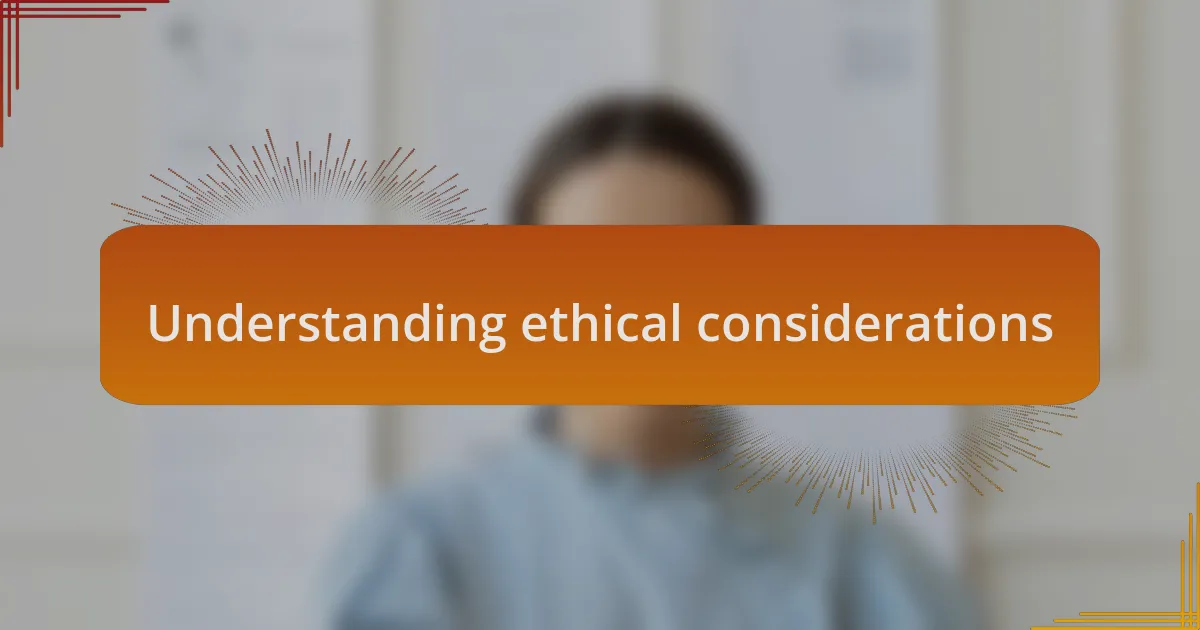
Understanding ethical considerations
Ethical considerations in the realm of social innovation are integral to navigating the complexities of community impact. I vividly remember a project where I had to weigh the potential benefits against the possibility of unintended consequences. It really challenged my understanding of what it means to act responsibly—does a good intention always lead to a good outcome?
As I delved deeper into ethical frameworks, I discovered that transparency plays a crucial role. For instance, I once led a collaborative initiative that aimed to improve access to education. We facilitated open discussions with community members on how our actions might affect them. This process not only fostered trust but also highlighted the importance of listening—how often do we truly consider the voices of those we aim to serve?
Moreover, it’s essential to reflect on the power dynamics at play in social innovation. I’ve witnessed projects where well-meaning outsiders inadvertently overshadowed local expertise, raising questions about equity and collaboration. When we innovate, who really benefits? Engaging in these reflections helps ground our work in the realities of those we hope to support.
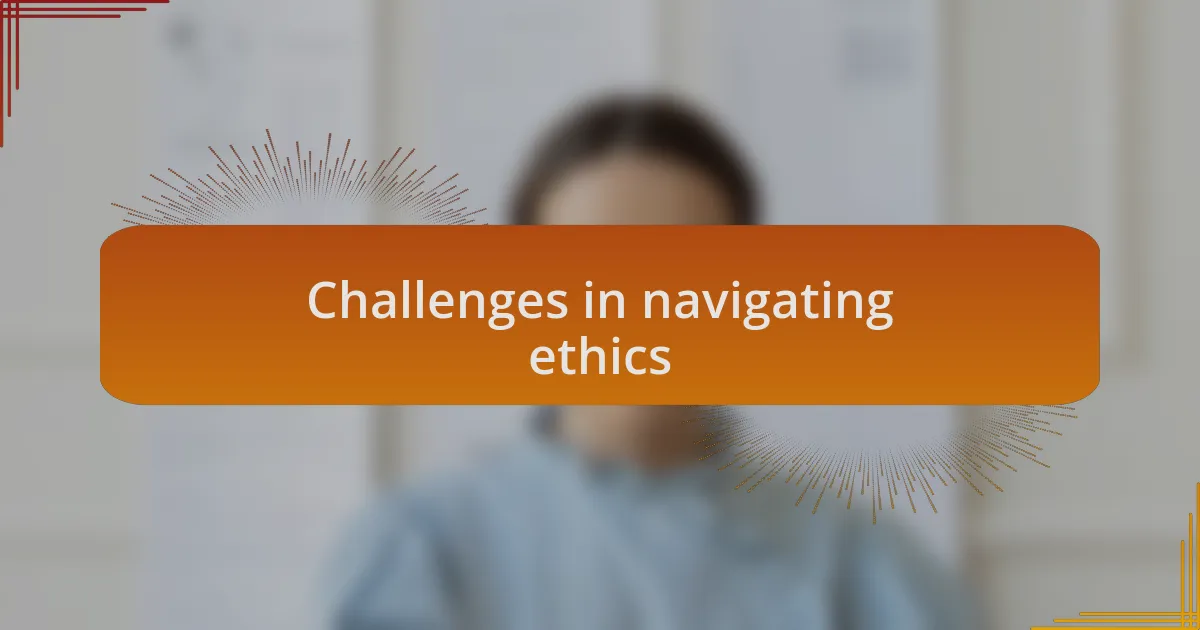
Challenges in navigating ethics
Navigating ethical challenges is often like walking a tightrope, requiring a balance between ambition and responsibility. I recall a time when I was part of a project aiming to provide meals for low-income families. The well-meaning initiative faced criticism for not involving the community in its planning. It made me question: how can we truly serve others if we don’t include their perspectives from the start?
One of the most daunting aspects of managing ethics in social innovation is the ever-present risk of oversimplifying complex issues. For instance, during a project focused on environmental sustainability, I found myself caught in a dilemma when stakeholders pushed for quick, impactful solutions. I struggled with the realization that rushing could compromise the very communities we aimed to help. This experience taught me the importance of patience—could it be that taking the time to engage thoroughly leads to richer, more sustainable outcomes?
In addition to community engagement, I often grapple with the ethical implications of data collection. During a recent initiative that measured the impact of our services, I was faced with the uncomfortable task of deciding how much information was necessary and how to protect privacy. It raised a fundamental question: at what point does the quest for knowledge, in service of improvement, become intrusive? This ongoing reflection reinforces the importance of integrity in our pursuit of social betterment.
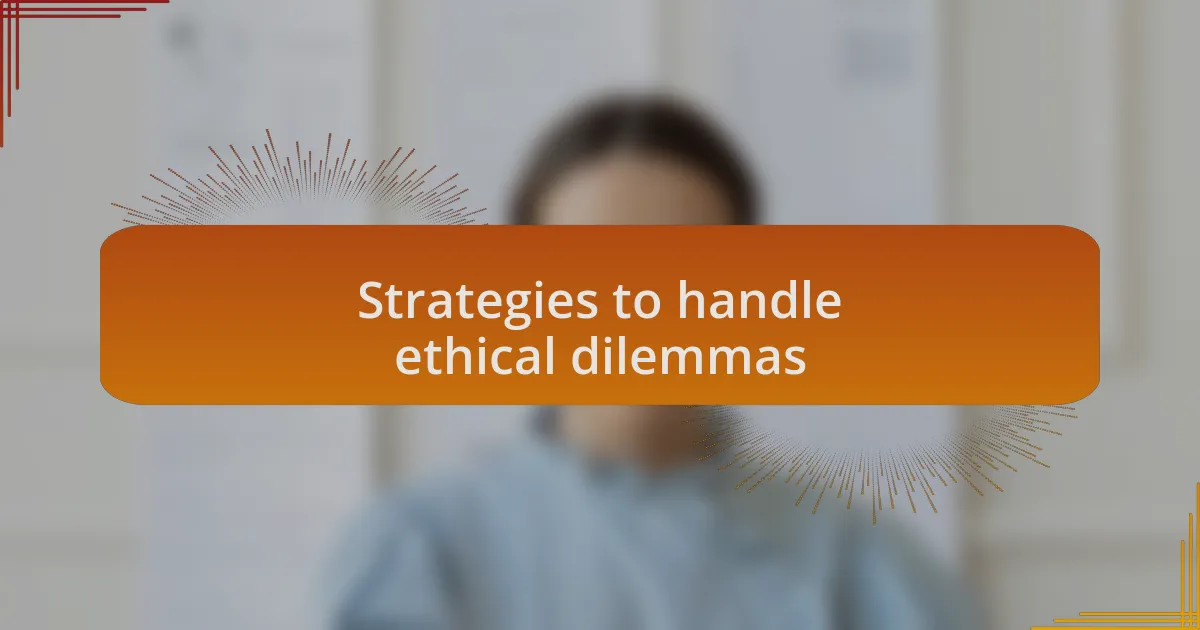
Strategies to handle ethical dilemmas
When I encountered ethical dilemmas during a community-based health initiative, one strategy that proved invaluable was fostering open dialogue with stakeholders. I recall organizing a forum where participants could voice their concerns and expectations. Listening to their feedback transformed my understanding of their needs, leading to more ethically sound decisions that felt inclusive and respectful. Does involving stakeholders in discussions really enhance the decision-making process? In my experience, the answer is a resounding yes.
Another effective approach I adopted was creating a framework for ethical decision-making tailored to the nuances of our projects. On one occasion, while working on a technology access program, we faced pushback regarding potential data biases. By establishing guidelines that prioritized transparency and accountability, we ensured everyone—especially the communities impacted—could trust our intentions. It required patience and commitment, but seeing how this framework empowered our team reinforced my belief that structure can guide ethical choices.
Lastly, I found that regularly revisiting our core values could mitigate ethical tensions. During one particularly challenging project, I made it a point to gather the team and reflect on why we started our work in the first place. This reaffirmation not only rekindled our passion but also aligned our actions with our foundational principles. Isn’t it fascinating how revisiting our core motivations can illuminate the path forward during murky times? Through this practice, I discovered a unique clarity that kept us grounded and focused on ethical integrity.
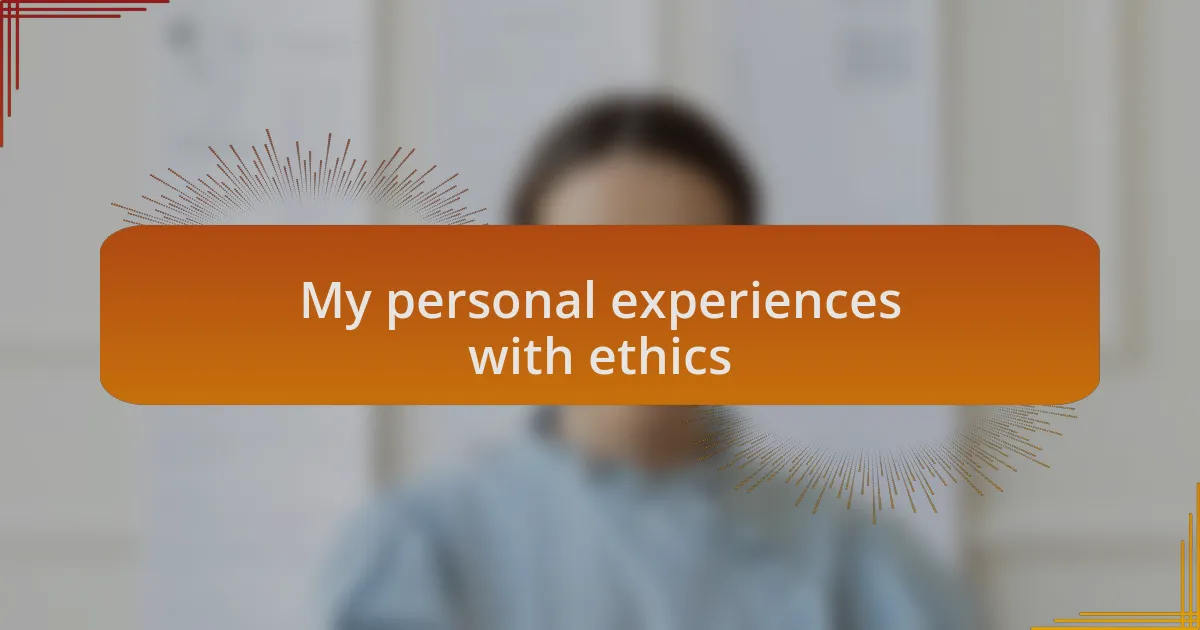
My personal experiences with ethics
Ethics have always played a pivotal role in my professional journey, especially when navigating the complexities of social innovation. I vividly remember a moment when I had to decide between meeting a tight project deadline and ensuring that our methods were ethically sound. Choosing the latter not only reinforced my integrity but also led to more robust outcomes as my team and I engaged in deeper, more meaningful discussions. Have you ever faced a similar crossroads where your values were put to the test?
One particularly striking experience occurred during a collaborative project with a marginalized community. After conducting interviews, feedback revealed a disconnect between our intentions and the community’s needs. Realizing that we might unintentionally perpetuate existing disparities was jarring. It reminded me that ethical considerations are not merely checkboxes to fulfill; they require ongoing reflection and adjustment. Reflecting on this taught me compassion and the importance of humility in our work.
In another instance, while mentoring new team members, I found myself emphasizing the necessity of transparent communication. I shared a troubling experience where a lack of clarity about project goals led to mistrust among stakeholders. The tension was palpable, and it was a lesson I won’t forget. This conversation underscored the idea that ethical decision-making isn’t just about right and wrong; it’s about fostering relationships built on trust and honesty. Isn’t it fascinating how the smallest choices can create ripples of impact?
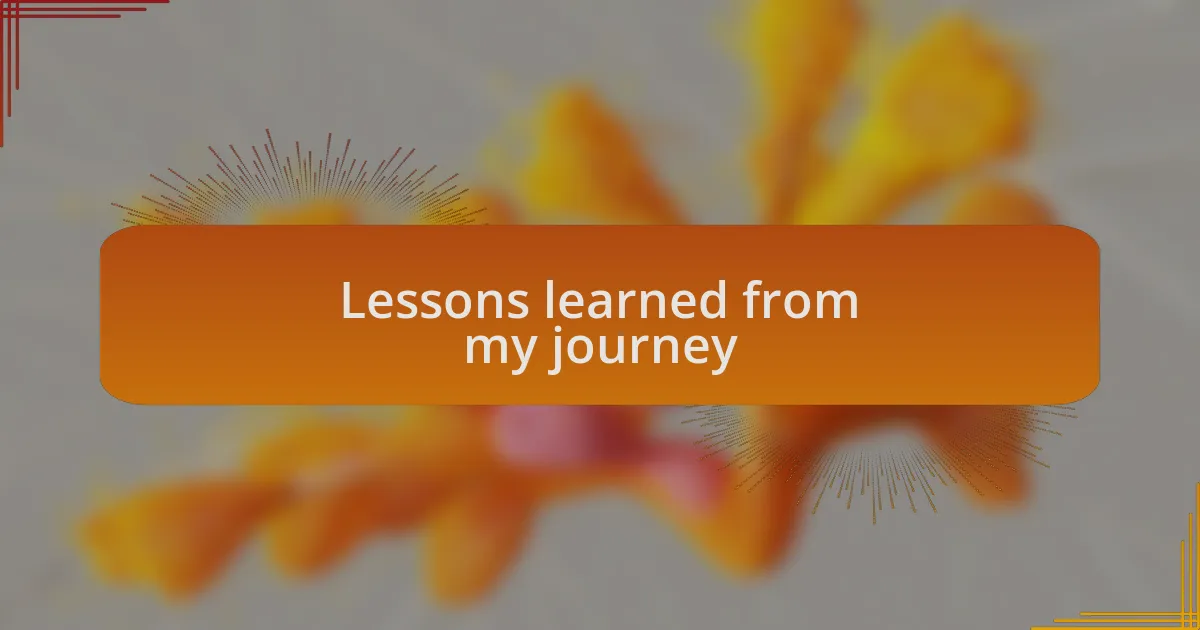
Lessons learned from my journey
One of the most significant lessons I learned revolves around the importance of active listening. During a project where I assumed I understood the community’s needs, I decided to push forward with our original plan. However, after taking the time to truly listen to their concerns, it became clear that my approach was misguided. This experience taught me that genuine engagement creates a foundation for ethical practices. Have you ever realized, through a conversation, that what you thought you knew was only half the story?
Another pivotal moment occurred when I faced a decision about resource allocation. I had to choose between investing more in a well-established program or supporting a burgeoning initiative that had the potential for greater impact but less visibility. Going with my gut and supporting the lesser-known program felt risky yet fulfilling, as it ultimately provided the community with a chance to innovate from within. This diversion from the conventional taught me that sometimes ethical choices require us to take leaps of faith and support the underdog.
Lastly, the concept of accountability emerged as a crucial theme in my journey. I vividly recall a situation where I had to admit a mistake to my team—one that jeopardized our timeline. Admitting that I had overshot my estimates was uncomfortable, yet it fostered a culture of openness and learning. The unexpected outcome was a stronger team dynamic and a renewed commitment to collective responsibility. What have you found about the power of vulnerability in leadership? I can confidently say that embracing accountability has transformed the way I approach my work.